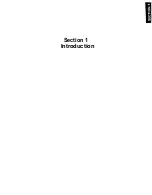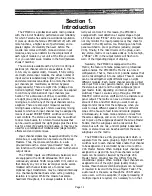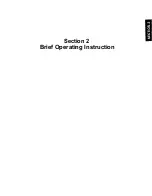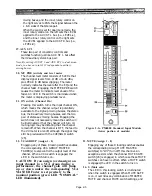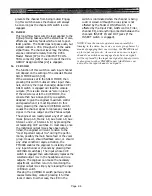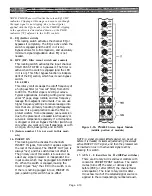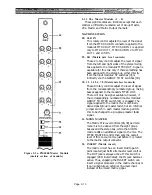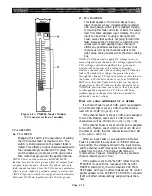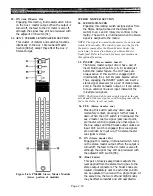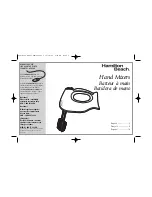
NOTE: PM3000 users will notice there is no EQ CLIP
indicator. Clipping at this stage can occur even though
the input signal is not clipping, due to boost (gain)
applied with the EQ circuitry. In the PM4000, clipping
in the equalizer is detected and shown on the PEAK
indicators [7S] adjacent to the GAIN controls.
13. EQ (In/Out switch)
This locking switch activates the channel EQ or
bypasses it completely. The EQ is active when the
switch is engaged (and the LED in it is on).
Bypass allows for A-B comparison, and absolutely
minimum signal degradation when EQ is not
needed.
14. HPF (H.P. filter in/out switch and control)
This locking switch activates the input channel
HIGH PASS FILTER or bypasses it. The filter is
active when the switch is engaged (and the LED
in it is on). This filter bypass function is indepen-
dent of the EQ section, which has its own bypass
switch.
2 0 ~ 4 0 0 H z
This rotary control sweeps the cutoff frequency of
a high pass filter (or "low cut" filter) from 20 Hz
to 400 Hz. The filter slope is 12 dB per octave.
Typical applications including cutting wind noise,
vocal “P” pops, stage rumble, and low frequency
leakage from adjacent instruments. You can use
higher frequency settings to reduce leakage into
mics that are primarily handling high-frequency
sources. It is a good practice to use the filter to
protect woofers from unnecessary over-excursion
due to the presence of unneeded low frequency or
sub-sonic components, especially if a microphone
is dropped or kicked. Bypass the filter (switch up)
only when you want very low frequencies, as with
an organ, drum, bass guitar, and so forth.
15. (feature number 15 is not used in this mod-
ule)
16. INSERT ON
This locking switch activates the channel’s
INSERT IN jacks, from which it applies signal to
the rest of the channel. The INSERT OUT jack is
always “live,” and this switch does not affect it.
The primary use of this switch is to select or de-
select any signal processor or independent line
input source which may be plugged into INSERT
IN. When the switch is engaged, making the
Insert In jack “live,” the LED in the switch is on.
If there is nothing plugged into an INSERT IN
jack, operating this switch has no effect.
Figure 2-2b. PM4000 Stereo Input Module
(middle portion of module)
NOTE: A signal processor (effects device) can be set up
before it is needed, its levels adjusted using the always
active INSERT OUT signal, and then the processor can
be inserted on cue in the channel’s signal path by
pressing this switch.
17. AUX 1 - 8 (Send level & Pre/Off/Post switches)
There are 8 rotary AUX send level controls with
concentric PRE/OFF/POST switches. The switch
mutes (turns off) the send, or derives signal
before (PRE) or after (POST) the channel fader
and equalizer. The inner rotary control deter-
mines how much of the selected signal source is
applied to the correspondingly numbered auxil-
Page 2-10
Summary of Contents for PM4000
Page 1: ...PROFESSIONAL AUDIO MIXING CONSOLE PM4000 OPERATING MANUAL YAMAHA ...
Page 2: ...PM4000 OPERATING MANUAL ...
Page 7: ...Section 1 Introduction ...
Page 11: ...Section 2 Brief Operating Instruction ...
Page 47: ...Section 3 Specifications ...
Page 51: ...Dimensional Drawings PM4000 Console all versions Page 3 4 ...
Page 52: ...Page 3 5 ...
Page 53: ...Page 3 6 PM4000 Console Rear Profiles ...
Page 54: ...Module Block Diagrams See back of the manual for overall system block diagram Page 3 7 ...
Page 55: ...Page 3 8 ...
Page 56: ...Page 3 9 ...
Page 57: ...Page 3 10 ...
Page 58: ...Page 3 11 ...
Page 59: ...Page 3 12 ...
Page 60: ...Section 4 Installation Notes ...
Page 72: ...Figure 4 13 Cables For Use With Balanced Sources Page 4 12 ...
Page 79: ...SECTION 5 Gain Structure and Levels ...
Page 82: ...Figure 5 1 Dynamic Range and Headroom in Sound Systems Page 5 3 ...
Page 86: ...Section 6 Optional Functions ...
Page 106: ...Section 7 Operating Notes and Hints ...
Page 119: ...Section 8 Applications ...
Page 127: ...Section 9 Maintenance ...
Page 131: ......
Page 132: ...YAMAHA VN02300 ...

